First Impressions/Travelling to Kagadi
Sunday May 29th 2016. We flew into the Entebbe airport in Uganda and boy are our arms still tired! Anyways, after several months of preparation, three plane flights totaling over 24 hours, a quick 45 minute drive to a hotel in Kampala (Uganda’s capitol), and another slightly-less quick and more arduous drive of 5-6 hours, we had finally reached our final destination in Kagadi. It is here that we and I will reside for six weeks. While here we will be working with URDT (Uganda Rural Development and Training, a primary, secondary and university school) to build latrine structures for the local community and to help the university with various projects. One of the projects we are most excited about is the arrangement and refurbishment of machinery in a corn mill from locally grown maze (a.k.a. as corn to the westerners out there). Stay tuned for future posts where we will go into much greater details about these projects! It is all very exciting, or as the Ugandans say, “Ah!”
For us, the journey began on the airplanes. Lucas had never flown on an international flight before and was unaware about the wonders of all their accommodations: A long list of free movies and television shows on a personal TV screen, free blankets and pillows, and even free meals and drinks! Many cups of wine were lost. We took separate flights to get to Brussels from Atlanta, but met up in Brussels for our last flight. That evening we landed in Entebbe, Kampala. After leaving Atlanta on Tuesday morning we finally landed in Entebbe on Wednesday night.
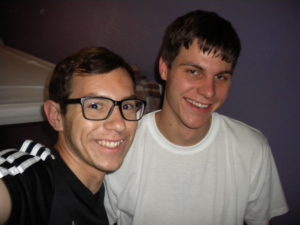
Staying in Kampala
Our first two nights in Uganda were spent in Kampala. In addition to being the capitol city, Kampala is also the largest city in Uganda, having a population of almost 2 million people. Most of these people live around downtown in very dense areas and it is common for a person to have a cell phone, running water and access to electricity. Our first night in Kampala was rather short due to our flight not landing until 8:00 pm and much of the night being spent at the airport trying to track down my lost checked bag. As of me writing this, I do not have my bag yet, but it has been tracked and should be in my possession this week! Finally, however, we did leave the airport and were immediately greeted by Grace and Emmanuel, workers for URDT. Emmanuel drove us to our hotel in Kampala, and is on this drive that we got our first taste of what Ugandan life looks like. Lucas began taking his first of hundreds (eventually thousands!) of pictures of Kampala as we drove through.
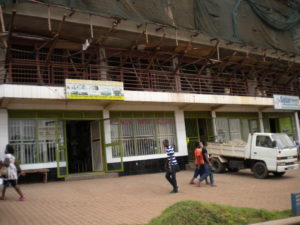
Our hotel we stayed at was very nice, having all the accommodations we could hope for: A room with mosquito netting, a private bathroom, running water, and electricity to charge our devices. Upon our arrival, we had our first Ugandan meal, consisting of chicken, rice and tea. Portions were aplenty, and typical of future meals we will have: Large quantities of starches (usually rice and potatoes), plenty of fruit (Jack fruit, mango and pineapple are common) as well as a portion of protein (most commonly chicken or beef, but occasionally pork or fish).
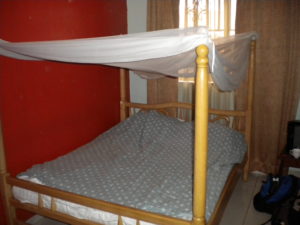

After our meal, we went to sleep, and prepared for our next day and a half in Kampala. We have many stories to tell from these, from going to the market place, to meeting friends such as Donald and Abass, to simply just driving down the hectic streets.
Why Don’t they Sell Sunscreen in Uganda?
While Brussels Airlines and United get my highest reviews in most categories, they have one glaring problem: They lost my bag! I had two layovers on my travel, and one of which was in Washington D.C. and was only an hour and a half long. While I was able to make this quick layover, my bag was not able to make it. I attribute my faster speed to having two legs while my bag has zero. This makes me exponentially faster of travelling on my own will.
Fortunately, I planned for this possibility and kept a couple changes of clothes as well as essential toiletries in my carry-on backpack. (Side note, the flight attendants on my from Atlanta to D.C. we’re trying to make me check my backpack at the gate but I said “NO!” and I’m glad I did! I would have been left with nothing but a ukulele and what I had in my pockets for the next week). More or less, I had everything I would need in the short term, except for a few small items that I could buy at the Kampala market. Or so I thought!
Much to my surprise, Uganda does not have a lot of white people. Which is no problem, except that white people are the driving market demand for sunscreen! And being on the equator and that we would be doing a lot of physical labor outside, sunscreen is a necessity for us Mazungas. We searched all over the markets and lotions aplenty could be found, but no sunscreen. In fact, none of the locals we asked we’re even familiar with this mysterious skin lotion.
Fortunately, Lucas has some that I can borrow, but future rations will be needed. After 3 days of uncertainty that my bag will ever show up, my bag was eventually traced and there is now hope that we will come home with non-leather skin.
Market in Kampala
The markets in Kampala were packed with people going to and fro. The streets were bustling with activity. We heard over and over again, “Mazunga, come here. Don’t you want to buy a towel? I have some shirts to fit you!” Ah! The sellers had their merchandise on stands and oftentimes stacked on the ground in great piles. We had to be shrewd negotiators at the markets because the vendors would try to give us the Mazunga price. The market was a very interesting experience. One vendor was even selling posters of dictators such as Saddam Hussein and Moamoar Ghadaffi! We did not ask why because we were busy declining the advances of boda drives that wished to take us to and fro in Kampala.
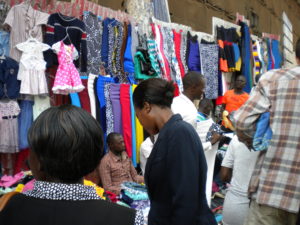
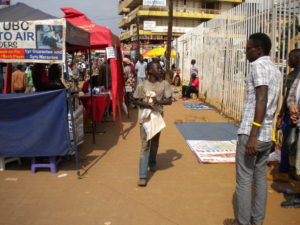
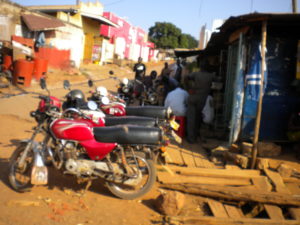
Abass Ndayisaba
The motel in Kampala that we stayed at had a manual gate. While we were waiting to be picked up from the motel the morning after our first night, we spoke to the man who opened the gate. His name was Abass Ndayisaba and was from Kagali, Rwanda. He revealed to us that he had come to Kampala looking for work. Abass only sleeps for one hour every day because cars are always coming in and out of the hotel. He does this labor for only 150,000 schillings a month, or approximately 47 American dollars. We were shocked to learn of such a low wage. We would learn that this is a normal wage in Uganda. He said that he had grown used to the long hours in the month that he had worked at the motel. Abass slept in a small room beside the gate. When he was able to catch a few moments of shut eye, he would be woken regularly by the horns of incoming cars. We would spend many moments with Abass as we waited at the motel. We would play the ukulele with him as he told us stories about Africa. He told us about the war in Sudan, about the rebels coming from the Congo to attack Uganda, about the strength of the Uganda military forces combating them, and especially about the companies recruiting Ugandans to work in Saudi Arabia and Qatar. He told us that these workers made as much as three million schillings a month, but were subjected to horrible working conditions. After we connected with Abass on Facebook, we would leave him at the motel as we traveled to URDT in Kagadi. Despite his situation, he maintains that he must not lose hope. He says that if a Kenyan man can become President of the United States, then by some miracle his situation can get better. We miss Abass very much and wish him very well in his endeavors.
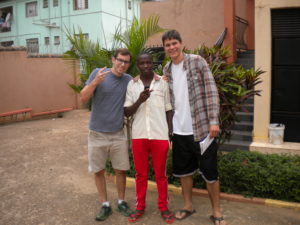
Driving in Uganda
Kampala itself has many paved roads. However, we observed that these roads were falling apart on the edges. There were also many potholes throughout the streets. They drive on the left side of the road in Uganda like they do in the U.K. There are many motorcycles, called bodas in Uganda. If you need a ride somewhere, you can pay for a boda to take you for as little as 1,000 schillings. Travelling to Kagadi took us through the very rural parts of Uganda. We saw a great deal of farm land as we traveled. Also the last 100 kilometers to Kagadi were all bumpy dirt roads. We were thankful that there was no rain during the ride as that would have slowed our journey very much. There were many people ogling at the Mazung traveling through their villages. The dirt road was very dusty, evidenced by a great deal of dust blown up into the shrubbery lining the roads. The road went through almost forest area dotted with the occasional farm.
